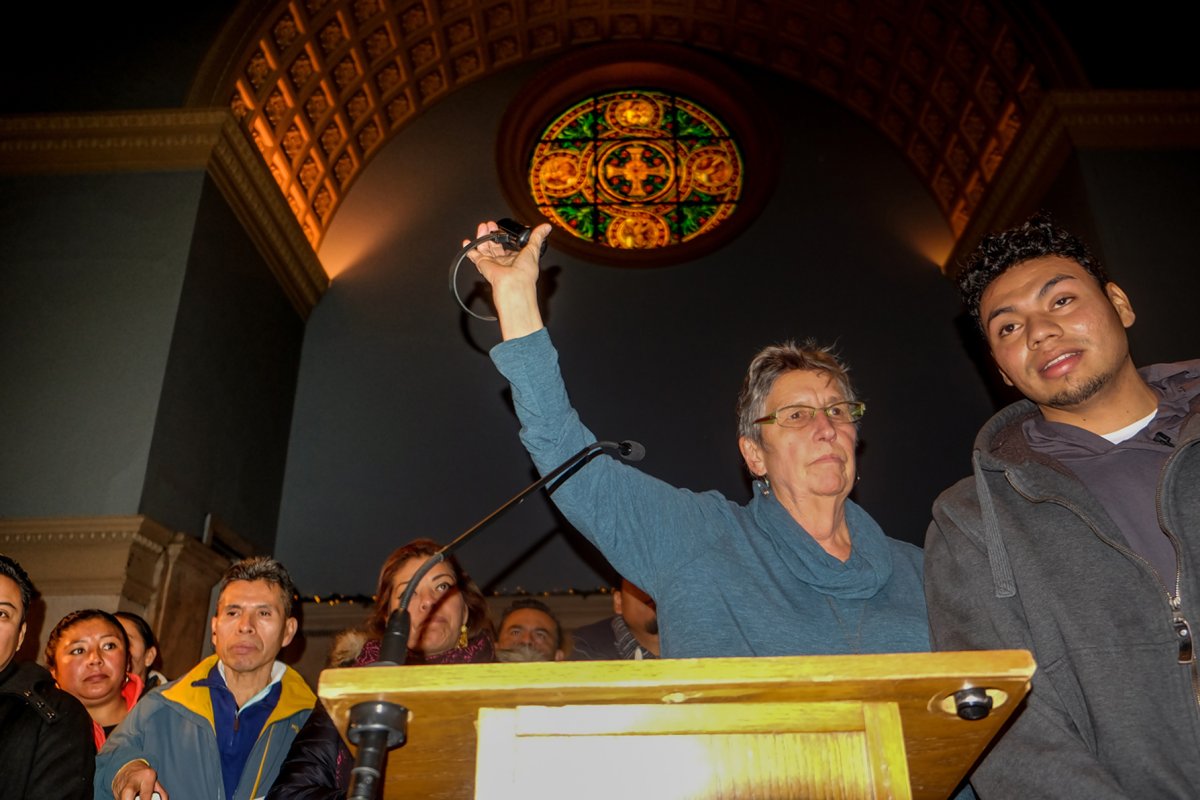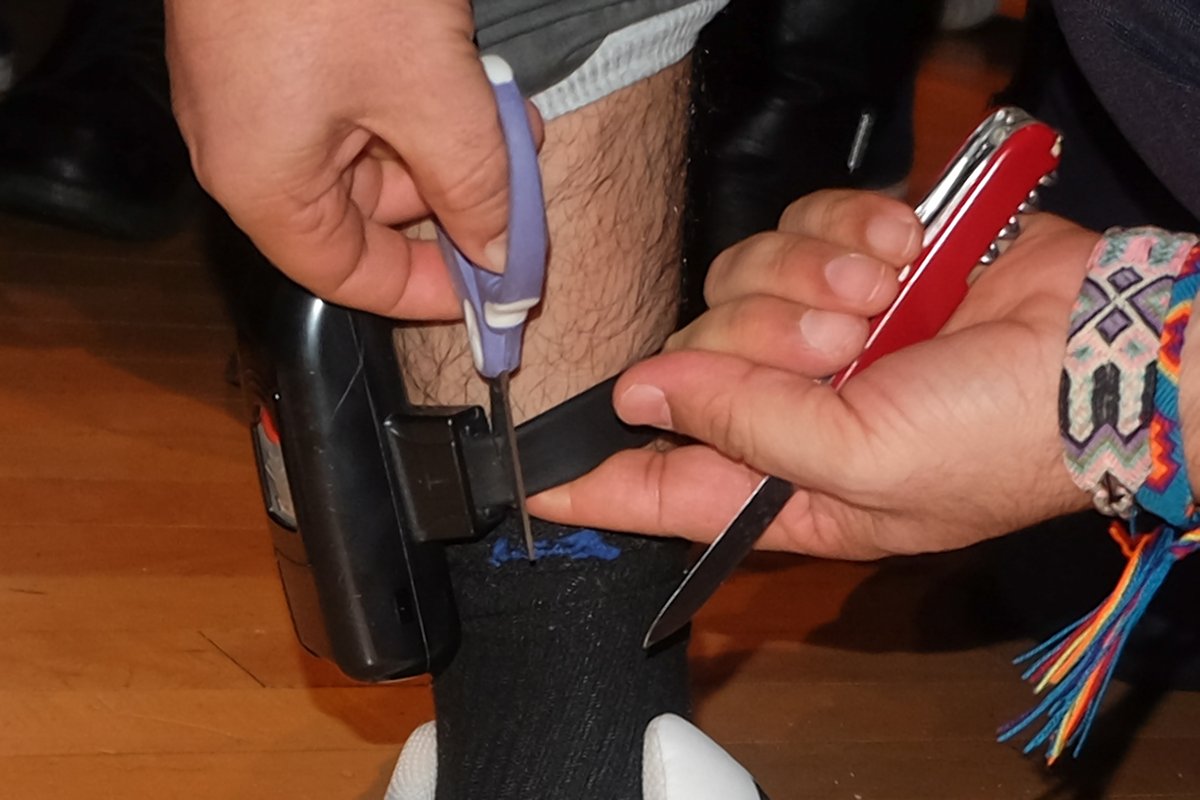
BY TEQUILA MINSKY | On Dec. 10, Judson Memorial Church’s Sunday service was more packed than usual. This inclusive congregation extends beyond its Washington Square South location. The building is also a designated New York City landmark, and was also added to the National Register of Historic Places in 1974.
Judson has long been known for social outreach and support and work with social justice programs.
On this particular morning, dozens of family members of APOFAM (Popular Assembly of Migrant Families), as well sanctuary families and members of other immigrant groups, crowded into the back of Judson’s sanctuary, to support and bear witness.
Gerzon C., 20, came across the Mexico-Texas border two years ago, escaping violence and extortion from criminal groups in his Central American country. He was traveling with his brother and sister to get away from aggressive gangs. Upon crossing the border, he was immediately put into U.S. detention.
Currently, he is in the process of getting a Special Immigrant Juvenile Visa, or S.I.J. — a protective status for youth fleeing violence in their home countries.
In the meantime, however, for much of the past two years, he has worn an ankle-bracelet monitor, owned and administered by Libre by Nexus, at a cost of $420 a month, which he must pay. The payments have totaled more than $6,000 so far, and none of this money even goes to a bondsman, who would post bail — just as in a criminal court case — to ensure that Gerzon would show up for any immigration-court proceedings.
As part of the Dec. 10 Sunday service, Gerzon, with the help of Reverend Juan Carlos Ruiz — the organizer and co-founder of the New Sanctuary Movement, based at Judson — removed the ankle bracelet.
In front of the packed Judson Hall, Ruiz cut off the ankle bracelet and Judson’s senior minister Reverend Donna Schaper then held it up for all to see.
“I feel free!” was Gerzon’s first remark. Through the translation by Ruiz, Gerzon explained why he took this step.
“I was being extorted in my country,” the young immigrant said. “I’m being extorted here,” he said, referring to the ankle monitor.

Ruiz was asked later if this act doesn’t now put Gerzon at risk.
“Gerzon believes there has to be a denunciation of this practice,” he responded. “If this is the land of the free, he wasn’t free and we have to do something.
“This is not civil disobedience, this is civil obedience!” Ruiz declared. “This is further violence, sanctioned and sealed by the federal government,” he said of the use of monitoring devices.
Ruiz noted that formerly slavery was legal, but that did not make that right.
“We have to make civil society aware to defy this shit!” he pronounced.
Gerzon wanted to cut off his monitor in a prayerful context. As Schaper explained, this act of defiance took place as a “powerful part of the prayer service in the ‘Joys and Concerns’ part of the Sunday service.”
In addition, also at the service were mothers from Latin America who have not seen their children for more than 20 years and were granted a limited-time “humanitarian visa” to enter the U.S.
Judson Church helped start and was the lead congregation of the New Sanctuary Coalition — a New York City-area-based interfaith network of more than 100 congregations, organizations and individuals, standing in solidarity with families and communities resisting detention and deportation in order to stay together.
The Libre by Nexus Web site for the monitoring device reads: “We get your loved one out of jail. No collateral.” Its marketing is meant to entice undocumented immigrants, visa violators or criminals who are being held in detention and don’t have the full bond money.
The Libre by Nexus program includes the use of GPS technology to secure bonds without cash by clamping an electronic monitor on the released detainee. The catch: The rental service fee is $420 a month, for as long as the person wears it.
According to a March 2017 article in the Washington Post, Libre requires the immigrant to pay 20 percent of his or her bond upfront. Libre then pays the bond agency 15 percent of the required bail to spring the immigrant from detention, while Libre keeps the remaining 5 percent. Meanwhile, the immigrant’s monthly charge is simply for the ankle monitor and does not pay down the amount of the bond.
Libre — which means “free” in Spanish but is a for-profit company — lists 22 offices in the U.S. on its Web site. According to the Washington Post article earlier this year, Libre had more than 6,500 clients at that time — though that number no doubt is growing under Trump’s crackdown on illegal immigrants. Libre by Nexus boasts yearly revenue of more than $30 million.
U.S. Immigration and Customs Enforcement also uses tracking bracelets to monitor documented immigrants, though those individuals do not have to pay. That program monitors about 30,000 persons.
Among the congregants at the Judson service was Keen Berger, the West Village female Democratic district leader, who has been a member of the Judson Immigration Task Force for 10 years.
“This is a holy act to set the captives free,” she said, quoting from Luke 4-18.
“And,” she added, “I agree with Juan Carlos, who before the unshackling, said about the 100 Mexicans plus 200 members of Judson, who bore witness together, ‘We need you and you need us.’”
































